Iran Sentences Two More Protesters To Death
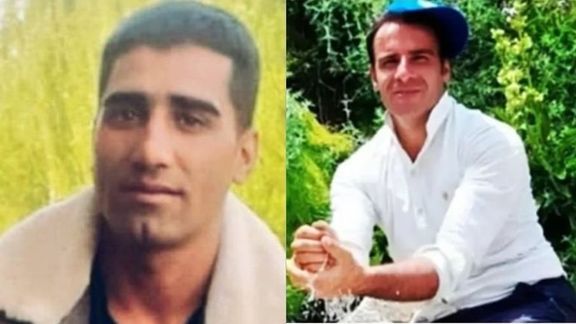
Human rights sources have reported that Mehran and Fazel Bahramian, two Iranian protesters, have been sentenced to death, the latest among Iran’s killing spree.

Human rights sources have reported that Mehran and Fazel Bahramian, two Iranian protesters, have been sentenced to death, the latest among Iran’s killing spree.
According to reports from Dadban, a group of pro-bono lawyers in Iran defending political prisoners and rights activists, the two protesters have been condemned to death in Semirom, Esfahan province, on charges of Moharebeh or "waging war against God."
Dadban further reveals that the two, detained since January last year, have endured severe torture, with Mehran Bahramian suffering broken arms and legs under torture.
Their arrests stemmed from their involvement in a fortieth-day ceremony honoring deceased protesters and their alleged connection to the death of a security officer named Mohsen Rezaei.
Fazel Bahramian's brother, Morad Bahramian, is counted among the victims of nationwide protests.
Despite domestic and international criticism, the judiciary of the Islamic Republic persists in handing down death sentences to protesters and political detainees.
The recent spate of executions in Iran has triggered a barrage of condemnation from human rights activists and global organizations. Vedant Patel, Deputy Spokesperson for the US Department of State, denounced the Iranian government's suppression tactics, highlighting the lack of democracy and transparency within its political system.
Earlier this month, the UN experts disclosed that at least 834 individuals were executed in Iran in 2023, with eight of them linked to nationwide protests. Urgently calling on the Iranian government to cease the ongoing wave of executions, the experts demanded a reassessment of the country's use of the death penalty.
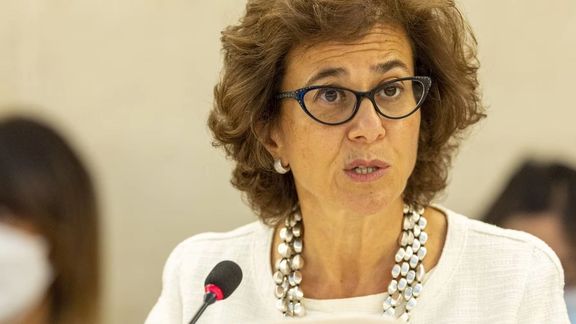
Iranian Peace Nobel Laureate Shirin Ebadi has urged a top UN human rights official to cancel her visit or meet with those on death row during her stay in Iran.
Nada Al-Nashif, UN Deputy High Commissioner for Human Rights, is scheduled to arrive in Tehran on February 3 to investigate executions and women’s rights violations.
In a message addressed to Al-Nashif on her Instagram Thursday, Ebadi pointed out that at least four prisoners including a protester, Mohammad Ghobadlou, and a Kurdish political prisoner, Farhad Salimi, were executed in one week after unfair trials and in violation of the Islamic Republic’s own laws just ahead of her visit to Iran.
Ghobadlou who had just turned twenty-four was hanged despite his death sentence being overturned by the Supreme Court which ordered a branch of Tehran Criminal Court to retry the case. Carrying out a death sentence despite such a ruling was unprecedented.
Ebadi recommended to Al-Nashif to cancel her visit in protest to “extra judicial and increasing executions to prevent the regime from taking advantage of it and using it for propaganda.
Ebadi also recommended Al-Nashif not to wear a headscarf, as Iranian authorities demand female foreign visitors to do, and to meet and talk with ordinary people alongside meetings with government officials.
“Visit Evin prison and talk with some of the women who are on hunger strike, including [2023 Peace Nobel Laureate] Narges Mohammadi, and the family of Mahsa Amini who was killed by government agents in September 2022 because of her hijab, and with several prisoners who are on death row such as Mujahid Korkur, among others, so that a fuller picture of the deplorable conditions of human rights [in Iran] is shown to you,” Ebadi wrote.
Another post on Ebadi’s Telegram channel Thursday about UN High Commissioner for Human Rights Volker Türk’s expression of concern over the spike in the use of death penalty in Iran, said “Expressing concern is not enough.”
The Islamic Republic which has the highest rate of executions in the world after China has executed 90 people just during December 22-January 21 this year.
Sixty-one female prisoners at Tehran’s Evin Prison from various political backgrounds including Nobel Peace Laureate Narges Mohammadi staged a one-day hunger strike Thursday in protest to the regime’s increasing use of executions including those of political prisoners.
Some activists in Iran and abroad including dissident rapper Toomaj Salehi and pop singer Mehdi Yarrahi, some of the families of prisoners, and political prisoners, including Zeynab Jalali who is serving a life sentence at Yazd Prison, have joined the hunger strike in solidarity with the prisoners at Evin.
Türk said in a statement on Wednesday that he is alarmed by the sharp spike in use of the death penalty in Iran including the two execution last Sunday. “This practice must be stopped immediately,” he said.
UN experts on January 21 also strongly condemned these recent executions and expressed serious concern at credible reports that those executed had been denied access to lawyers during their detention and trial.
The mothers of four death-row political prisoners -- Mohsen Mazloum, Pezhman Fatehi, Vafa Azarbar, and Hazhir Faramarz – have also pleaded with Al-Nashif to urge Iranian authorities to halt the impending execution of their sons as well as other prisoners on death row.
The hashtag #NoToExecution has been trending among Iranian social media users following the announcement of the hunger strike and a tweet storm on Monday has been announced.
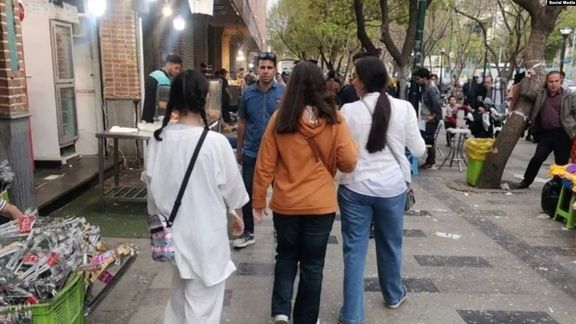
Iran's Chief Justice has ordered prosecutors to take "decisive" action against those who are allegedly encouraging defiance of hijab rules in an "organized manner."
Gholamreza Mohseni-Ejei directed prosecutors this week to act in the name of the public and identify those "organized and foreign-affiliated elements" who oppose hijab rules. They are to be put on trial and punished within the framework of the law with the assistance of law enforcement.
This directive suggests a shift in focus from merely not wearing hijab to charging individuals involved in "organized" opposition to hijab with offenses such as "collusion and assembly to act against national security." In recent years, anti-compulsory hijab activists have faced fabricated charges, with some sentenced to prison, like Vida Movahed, who received a one-year sentence for her protest against mandatory hijab in 2017.
The 32-year-old woman had climbed a utility box in a busy Tehran Street, removed her headscarf, tied it to a stick and silently waved it in protest to mandatory hijab in Iran in 2017.
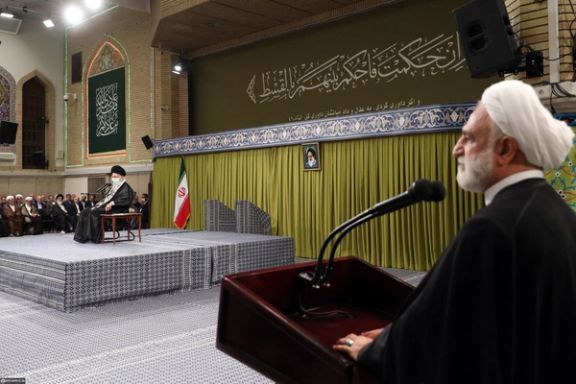
Mohseni-Ejei emphasized the Islamic principle of "amr-e be marouf va nahy az monkar," which urges Muslims to encourage good deeds and discourage forbidden ones. However, he noted that not all problems can be solved through preaching and called for legal action against those with ties to foreign countries who resist Iran's values and security.
“People who have ties to foreign [countries] and intend to resist the people's values, their chastity, and [harm] their psychological and physical security should be dealt with the sword of justice,” he said.
Iranian authorities often use the tactic of accusing dissidents of having ties to foreigners, in order to charge them with security crimes, rather than just political offences.
In recent years, many Iranian women have protested mandatory hijab, leading to arrests and imprisonment. Authorities have also impounded thousands of cars and closed businesses for failing to enforce hijab rules.
A police official in the religious city of Qom, where most of Iran's Shiite seminaries are located, said last week that in the past ten months owners of 74,000 cars had received warnings for hijab violations with nearly 20,000 impounded and nearly 2,000 cases referred to courts.
These numbers showed a six-fold increase in comparison to the same period last year, he said.
This move by the chief justice appears to address criticism from high-ranking clerics and seminary teachers who have expressed concerns about the perceived weakening of hijab enforcement. Grand Ayatollah Hossein Nouri-Hamedani and a group of seminary teachers in Qom have called for stronger measures to address defiance of hijab rules, expressing fears that it could lead to "extensive immorality" and harm the country's independence.
In a letter addressed to the president, chief justice, and parliament speaker earlier this week, one hundred teachers of Qom seminaries demanded decisiveness in dealing with what they called the “phenomenon” of defiance of hijab.
The signatories of the letter insisted on enforcing Islamic rules and alleged that the refusal of women to abide by mandatory hijab rules could be used by “enemies” and “feminists”.
“Enforcement of the law and prevention of [moral] corruption, of course, entails costs which we have to pay if we want to implement Islam,” they wrote.
“One hundred have written a petition to the heads of the state under the name of seminarians and complained about everything, from cinema and women's sports to hijab, but said nothing about inflation, the state of people’s livelihood, and the country's economy!” dissident journalist Saeed Maleki tweeted, suggesting that after the upcoming elections authorities will be taking tougher measures to address the concerns of these clerics.

Iran’s top Sunni cleric Mowlavi Abdolhamid urged reforms in the Iranian constitution on the eve of upcoming elections.
“The current constitution was ratified at the time of the previous generation. A new generation and new conditions and demands have emerged but the law has not changed,” said the top religious leader of Iran’s largely Sunni Baluch (Baloch) population in his Friday prayer sermons in Zahedan.
Abdolhamid also criticized the vetting process of the Guardian Council which only allows hardliners to run as candidates in the elections, further questioning the council’s decision to disqualify Iran’s former president Hassan Rouhani.
On Wednesday, it was announced that Rouhani, once considered to be one of the candidates for succeeding Supreme Leader Ali Khamenei, has been barred from running for re-election at the Assembly of Experts that is tasked with electing the next leader.
Abdolhamid also called on the Islamic Republic to review its execution campaign, warning that it will widen the gap between the people and the political establishment.
The Halvash website, which covers developments in Sistan-Baluchestan Province, reported the extensive presence of the security forces in Zahedan at the same time as the Friday prayers were held.
The people of Sistan-Baluchestan, with Zahedan as provincial capital, have been holding weekly demonstrations after security forces opened fire at peaceful protesters, killing nearly 100 on September 30, 2022, a day known as the Bloody Friday of Zahedan.
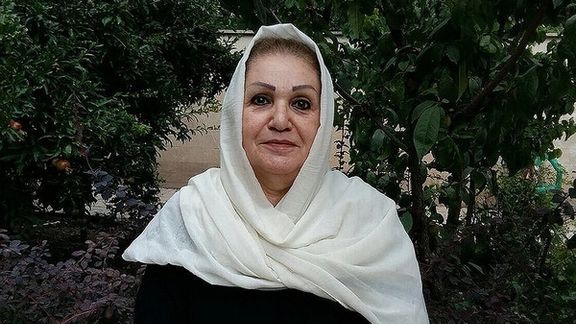
Iranian human rights activist Raheleh Rahemipour was taken to hospital on Thursday following a heart attack.
Rahemipour is one of the four political prisoners in the women’s ward of Evin who are over 70 years old. She was imprisoned in November to serve a five-year prison sentence, despite suffering from a brain tumor and other ailments.
Tehran’s Revolutionary Court headed by notorious Judge Abolqasem Salavati sentenced Rahemipour to six years in prison over such allegations as “propaganda against the government” and attempts to “disrupt national security.”
Her brother, Hossein Rahemipour, was also a political prisoner who was executed in 1984. His child, born in Evin prison, was never handed over to his family after his execution.
A group of 61 women political prisoners went on a hunger strike in the women’s ward of Evin on Thursday to protest the Islamic Republic’s ruthless execution spree, including the execution of Mohammad Ghobadlou.
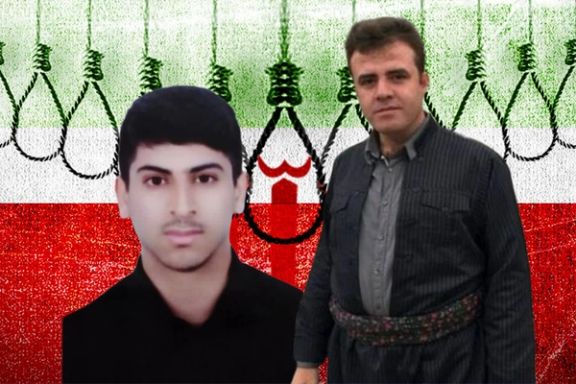
Two more political prisoners, Yousef Ahmadi and Ali Abidavi, have been sentenced to death amid Iran's ongoing killing spree.
The two are the latest victims of the government's crackdown on dissent following a record year in 2023 seeing 834 executions according to the United Nations, eight linked to the nationwide protests which began in 2022.
Ahmadi, originally sentenced in September by the Revolutionary Court of Sanandaj on charges of "corruption," saw his appeal denied, while Abidavi, along with his brother Hossein, received their verdict from the Revolutionary Court of Mahshahr.
Ahmadi, along with co-defendants Mohammad Karimi, Baset Karimi, and Mohammad Feizi, were arrested in May 2020 in Baneh, Kordestan province, under accusations of collaborating with an opposition party. Reports indicate they were subjected to severe torture to extract confessions, which led to Ahmadi's death sentence and varying prison terms for the others.
Simultaneously, Ali and Hossein Abidavi faced the judiciary in Mahshahr, accused of attacking a Basij base four years ago. Ali Abidavi received the death penalty, while his brother was sentenced to 13 years behind bars.
This week, the UN's experts slammed the execution of Mohammad Ghobadlou, a 23-year-old protester with a long-term psychosocial disability.